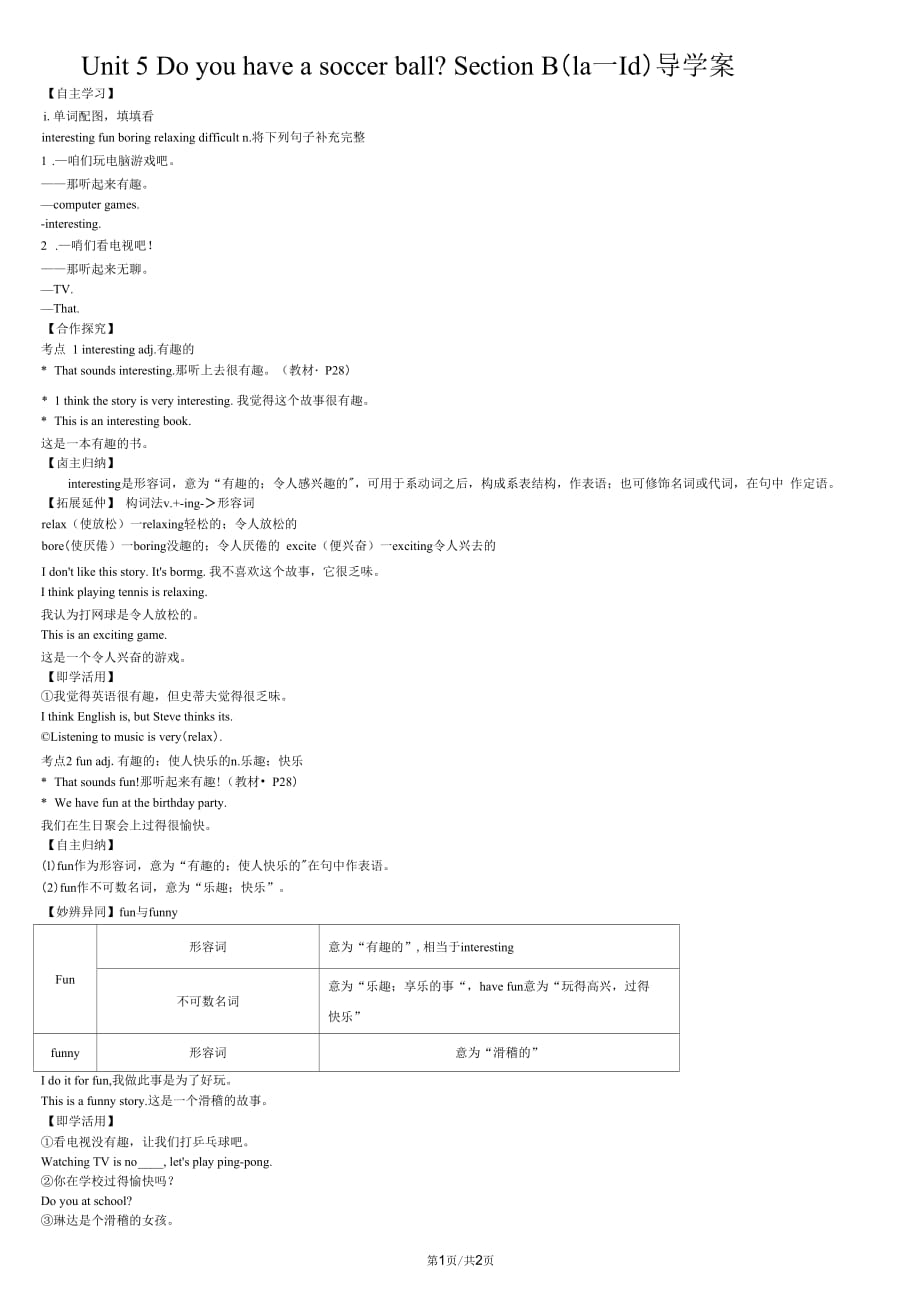《人教七上Unit5DoyouhaveasoccerballSectionB(1a1d)導(dǎo)學(xué)案(無(wú)答案)》由會(huì)員分享,可在線閱讀���,更多相關(guān)《人教七上Unit5DoyouhaveasoccerballSectionB(1a1d)導(dǎo)學(xué)案(無(wú)答案)(2頁(yè)珍藏版)》請(qǐng)?jiān)谘b配圖網(wǎng)上搜索���。
1、Unit 5 Do you have a soccer ball? Section B(la一Id)導(dǎo)學(xué)案
【自主學(xué)習(xí)】
i.單詞配圖���,填填看
interesting fun boring relaxing difficult n.將下列句子補(bǔ)充完整
1 .—咱們玩電腦游戲吧���。
——那聽(tīng)起來(lái)有趣���。
—computer games.
-interesting.
2 .—哨們看電視吧!
——那聽(tīng)起來(lái)無(wú)聊���。
—TV.
—That.
【合作探究】
考點(diǎn) 1 interesting adj.有趣的
* That sounds interesting.那聽(tīng)上去很有趣���。(教材?P
2、28)
* 1 think the story is very interesting. 我覺(jué)得這個(gè)故事很有趣���。
* This is an interesting book.
這是一本有趣的書(shū)���。
【鹵主歸納】
interesting是形容詞���,意為“有趣的���;令人感興趣的",可用于系動(dòng)詞之后���,構(gòu)成系表結(jié)構(gòu)���,作表語(yǔ)���;也可修飾名詞或代詞,在句中 作定語(yǔ)���。
【拓展延仲】 構(gòu)詞法v.+-ing->形容詞
relax(使放松)一relaxing輕松的���;令人放松的
bore(使厭倦)一boring沒(méi)趣的;令人厭倦的 excite(便興奮)一exciting令人興去的
I dont like
3���、this story. Its bormg. 我不喜歡這個(gè)故事���,它很乏味。
I think playing tennis is relaxing.
我認(rèn)為打網(wǎng)球是令人放松的���。
This is an exciting game.
這是一個(gè)令人興奮的游戲���。
【即學(xué)活用】
①我覺(jué)得英語(yǔ)很有趣,但史蒂夫覺(jué)得很乏味���。
I think English is, but Steve thinks its.
Listening to music is very(relax).
考點(diǎn)2 fun adj.有趣的���;使人快樂(lè)的n.樂(lè)趣���;快樂(lè)
* That sounds fun!那聽(tīng)起來(lái)有趣!(教材?
4、 P28)
* We have fun at the birthday party.
我們?cè)谏站蹠?huì)上過(guò)得很愉快���。
【自主歸納】
(l)fun作為形容詞���,意為“有趣的;使人快樂(lè)的"在句中作表語(yǔ)���。
(2)fun作不可數(shù)名詞���,意為“樂(lè)趣;快樂(lè)”���。
【妙辨異同】fun與funny
Fun
形容詞
意為“有趣的”,相當(dāng)于interesting
不可數(shù)名詞
意為“樂(lè)趣;享樂(lè)的事“���,have fun意為“玩得高興���,過(guò)得
快樂(lè)”
funny
形容詞
意為“滑稽的”
I do it for fun,我做此事是為了好玩���。
This is a funny story.這是一個(gè)滑稽
5、的故事���。
【即學(xué)活用】
①看電視沒(méi)有趣���,讓我們打乒乓球吧。
Watching TV is no , lets play ping-pong.
②你在學(xué)校過(guò)得愉快嗎���?
Do you at school?
③琳達(dá)是個(gè)滑稽的女孩���。
Linda is a.
考點(diǎn)3 watch v,注視;觀看
* Let s watch TV.咱們看電視吧���。(教材?P28)
* 1 always watch volleyball games on TV.
我總是在電視上觀看排球比賽���。
* Excuse me, Jane. Do you have a watch?
打擾了,簡(jiǎn)���。你有手表嗎���?
【
6���、鹵主歸納】
(l)watch作動(dòng)詞,意為“注視���;觀看”���,其動(dòng)詞第三人稱單數(shù)形式為watches。
(2)watch作名詞���,意為“手表”���,其復(fù)數(shù)形式為watches。
【妙辨異同】
watch指”(聚精會(huì)神地)首���;注視: 如看電視���、比賽等
看電視watch TV
look強(qiáng)調(diào)“看的動(dòng)作,作不氏物動(dòng)詞
看黑板 look at the blackboard
see強(qiáng)調(diào)“看”的結(jié)果���,如看電影、看病等
看電影see a film
read指“閱讀”���,如看書(shū)���、報(bào)刊���、雜志等
看報(bào)紙 read the newspaper
【即學(xué)活用】
①Here are two(watch)on t
7、he desk.
②史密斯先生每天晚上都看電視���。
Mr Smith every evening.
③一Let s the basketball game on TV.
—That sounds great.
A. watch B. look C. see D. read
【當(dāng)堂達(dá)標(biāo)】
I.用所給詞的適當(dāng)形式填空
1. Its(relax)to be at home.
2. —Do you like this book?
一Yes. Its ail(mterest)book.
3. —Lets play ping-pong.
—That(sound)fun.
4. Mr
8���、. Brown has six(watch)and two radios.
5. 1 think playing computer games all day is(bore), n.單項(xiàng)選擇
1. Do you have volleyball? Lets play volleyball.
A. a; a B. a; the C. the; / D. a; /
2. —Lets play ping-pong.
—That sounds. Lets play computer games.
A. relaxing B. fun C. boring D. interesting
3.
9、 Mary always TV in the evening.
A. sees B. watches C. reads D. looks
4.1 a baseball bat and my brother two baseballs.
A. have; have B. has; has
C. has; have D. have���; has
5. _your friend a soccer ball?
—No. He only has a basketball.
A. Is; have B. Do; have
C. Does; have D. Docs; has
【課后反思】
第2頁(yè)/共2頁(yè)
 人教七上Unit5DoyouhaveasoccerballSectionB(1a1d)導(dǎo)學(xué)案(無(wú)答案)
人教七上Unit5DoyouhaveasoccerballSectionB(1a1d)導(dǎo)學(xué)案(無(wú)答案)

